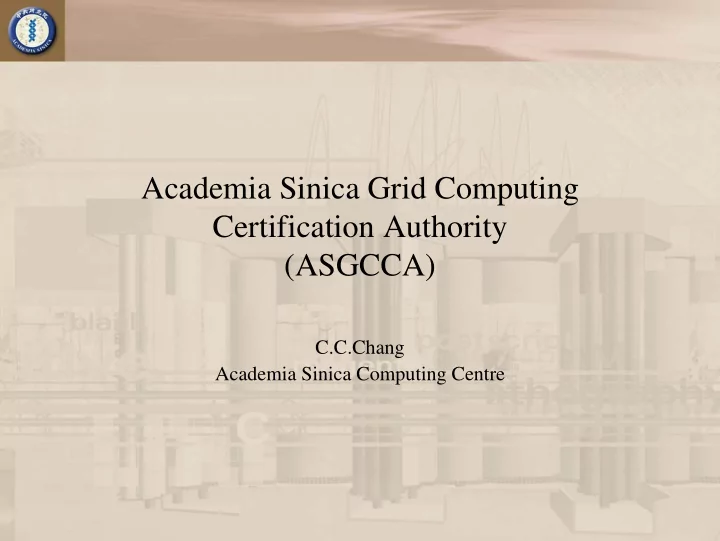

Academia Sinica Grid Computing Certification Authority (ASGCCA) C.C.Chang Academia Sinica Computing Centre
Outline • Introduction to ASGCC / ASGCCA • Procedural Security • Physical Security • Technical Security • Contact Information • Related Information
Academia Sinica Grid Computing Centre (ASGCC) • Based in Academia Sinica, one of the foremost research institute in Taiwan. • Provides Grid-based service, support and e- Science application development for Academia Sinica and its collaboration institutes • Fosters Grid computing and e-Science application in Taiwan, Asia.
Academia Sinica Grid Computing Certification Authority (ASGCCA) • The ASGCCA is established and managed by Academia Sinica Grid Computing Centre in Taiwan and has been running since July 2002.
Procedural Security • End Entity and Certificate Type • Identification and Authentication • Certificate Request • Certificate Revocation • Records Archival
End Entity and Certificate Type • End Entities: – Users of Academia Sinica Computing Centre – Users of Domestic/International Grid-based Application/Projects • Certificate Type – User Certificate C=TW, O=AS, OU=CC, CN=Yuan Tein Horng / emailAddress=yth@beta.wsl.sinica.edu.tw – Host Certificate C=TW, O=AS, OU=CC, CN=beta.wsl.sinica.edu.tw – Service Certificate C=TW, O=AS, OU=CC, CN=FTP/beta.wsl.sinica.edu.tw
Identification and Authentication • User certificate: – Academia Sinica Staff: • Subscriber must be already registered at the Academia Sinica Grid Computing Directory Service (ASGCDS) as a user defined in end entities. • RA staff will check account registered on ASGCDS and contact subscriber personally. – International Collaborator: • Subscribers fax the certificate application form • RAs will verify / confirm the identity of subscriber with project collaborators. • RAs confirm / approve the user application to CA administrator. • Subscribers apply for certificate via ASGCCA website, user private key generated by users’ browser and CSR generated & saved by ASGCCA web server. • CA administrator signs the CSR and sends the issued certificate. • Host or service certificate: – Requests must be signed with a valid personal ASGCCA certificate – RA will check the FQDN of the host before issuing certificate
Certificate Revocation • Circumstances for Revocation – The entity’s private key is lost or suspected to be compromised. – The information in the entity's certificate is suspected to be inaccurate. – The entity requests for revocation. – The entity violates its obligations.
Procedure for Revocation Request • The person requesting the revocation of certificate must authenticate himself in one of the following ways: – sending an email, signed by a valid and trusted certificate, to asgcca@grid.sinica.edu.tw, RA will contact subscriber for confirmation. – In the other cases, authentication is performed with the same procedure used to authenticate the identity of person.
Records Archival • RA must record and archive – All requests (including application forms) – All confirmations • CA must record and archive – All requests for certificates – All issued certificates – All requests for revocation – All issued CRLs – Login/Logout/Reboot of the issuing machine • All archive data is stored and backed-up in safekeeping. • The retention period for archives is 3 years
Physical Security • The CA issuing machine is – a dedicated machine – not connected to any network – located in Academia Sinica computing room, access to the room will be recorded and accompanied by room administrator. – ASGCCA private key and pass phrase stored and locked in a safe
Technical Security • Key Generation • Key Restriction • Certificate Restriction • CRL Policy
Key Generation • Private key is generated by browsers on the users’ machine. • CA and RA will never generate private key on user’s behalf. • CA and RA have no access to the users’ private key.
Key Restriction • Key Length – ASGCCA private key is 2048 bits – User private key must have at least 1024 bits – Host private key must has at least 1024 bits – Service private key must has at least 1024 bits • Pass phrase – The pass phrase of CA’s private key is at least 15 characters – The pass phrase of end entity’s private key is at minimum 12 characters. – Protecting the pass phrase from others
Certificate Restriction • Certificate Lifetime for – ASGCCA certificate is 5 years – user certificate is one year – host certificate is one year – service certificates is one year • User certificate should not be shared.
CRL Policy • The lifetime of CRL is 30 days • CRL is updated immediately after every revocation • CRL is reissued 7 days before expiration even if there have been no revocations
Certificate Statistics User Certificate Host Certificate Service Certificate Total Issued 91 146 3 228 Effected 40 84 3 173 Revoked 51 62 0 55 Last update: Thu Oct 20 04:03:46 CST 2005 http://ca.grid.sinica.edu.tw/publication/status.html
Contact Information Contact Person: Yen, Eric Mail Box: Nankang PO BOX 1-8 Taipei, Taiwan 11529 Address: 128, Sec. 2, Academia Road, Nankang, Taipei, Taiwan 11529 Phone: +886-2-2789-9494 Mobile: +886-922-959211 Fax: +886-2-2783-6444 email: asgcca@grid.sinica.edu.tw
Related Information • Homepage – http://ca.grid.sinica.edu.tw • CP/CPS – Latest version: 1.5 – OID: 1.3.6.1.4.1.5935.10.1.1.5 – Follows the RFC 2527 structure – http://ca.grid.sinica.edu.tw/CPS/ • ASGCCA certificate – http://ca.grid.sinica.edu.tw/ASGCCA.crt • CRL – http://ca.grid.sinica.edu.tw/CRL/
The End
Recommend
More recommend